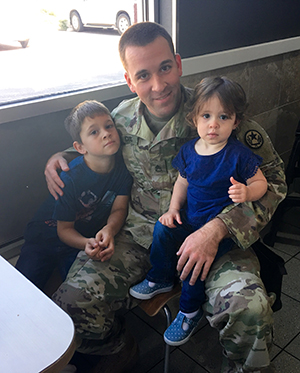 Texas Army National Guard Staff Sgt. Aaron Dias, recruiting and retention officer for the Recruiting and Retention Battalion, Region II, Team VII, enjoys lunch with his six-year-old son Gavin, left, and 18-month-old Aeryn, right, at a local resturant Nov. 12, 2016, in Tyler, Texas. Dias is responsible for rendering aid and saving the life a blind pedestrian that was struck by a vehicle in East Texas. (U.S. Army National Guard photo by Sgt. Elizabeth Pena)
Texas Army National Guard Staff Sgt. Aaron Dias, recruiting and retention officer for the Recruiting and Retention Battalion, Region II, Team VII, enjoys lunch with his six-year-old son Gavin, left, and 18-month-old Aeryn, right, at a local resturant Nov. 12, 2016, in Tyler, Texas. Dias is responsible for rendering aid and saving the life a blind pedestrian that was struck by a vehicle in East Texas. (U.S. Army National Guard photo by Sgt. Elizabeth Pena)
Story by: Sgt. Elizabeth Pena
Posted: Monday, January 9, 2017
TYLER, Texas – Disaster can strike at anytime. Citizen-soldiers of the Texas Army National Guard are taught to always be prepared.
Texas Army National Guard Staff Sgt. Aaron Dias, recruiting and retention officer for the Recruiting and Retention Battalion, Region II, Team VII in Tyler, was driving back from the Military Entrance Processing Station in Shreveport, Louisiana, to his armory in Tyler with his recruit when disaster struck.
“The sun was starting to set,” said Dias. “It was to that point where you run into the sun it kind of casts a glare on you.”
Hiwatha Hudson, a legally blind 55-year-old man had just stepped off to cross the street with his cane.
“My applicant in the passenger seat hollered at me ‘there’s someone on the road!’ said Dias. “Sure enough, as soon as we cast over the hill, I saw a silhouette of a man and I swerved to miss him.”
At that moment Dias was thankful he avoided the man, but as he was pulling over, he saw something horrid.
“Then I looked back in my rearview mirror, I saw someone hit him so I turned around, jumped in the suicide lane and jumped to assist him,” said Dias.
Without hesitation, Dias immediately called 911 and took the situation into his own hands.
“I jumped out, got my applicant to start blocking traffic. When I came up to the man he was face down and the blood was running down pretty heavy,” said Dias. “So I rolled him over on his side to the recovery position to kind of balance his head so the blood
would drain out and I held him there and checked his pulse until the EMT arrived.”
The recovery position, one of the many skills learned in the military, is designed to prevent suffocation through obstruction of the airway.
“We are taught over and over, repetition so that way when it comes to a situation like this, you don’t think you just react. I don’t think if I had that training or that repetition of training I don’t know if I would have done anything successfully like I did,” said Dias.
Service members in the Texas Army National Guard must go through combat life saving courses throughout their military career and are taught to always be ready to help.
Dias, father of two, has been a member of the guard for over ten years.
“Every other generation of my family has served,” said Dias. “It’s a duty, it’s an honor and opportunity to put on this uniform everyday.”
Hudson has since been transferred to the Ocean Behavior Hospital in East Texas.
“I am so glad he was there to render aid because if he hadn’t, I would not have my son today,” said Jerleane Hudson, mother of Henry. “I’m praying that God will forever bless him.”
Although he has not made a full recovery, it is Dias’s fast response that saved his life.
“People will drive past people in wrecks all the time they won’t stop and ask if they’re OK. Heck it could've been you, or me and I would pray that someone would stop and do what they could, whether it was helpful or not, at least they were trying. You know, just help," said Dias.
Thousands of fatalities every year in casualties where the cause of the unconscious was not fatal, but the airway was blocked, causing the patient to suffocate. Dias accredits the military with giving him the knowledge and experience to respond to this situation.
“It’s a part of being in the military but it’s also a part of just being raised in a small town. You help anyone that needs help. That also goes hand in hand with being in the guard. We are citizen soldiers we are supposed to help out wherever we can,” said Dias.